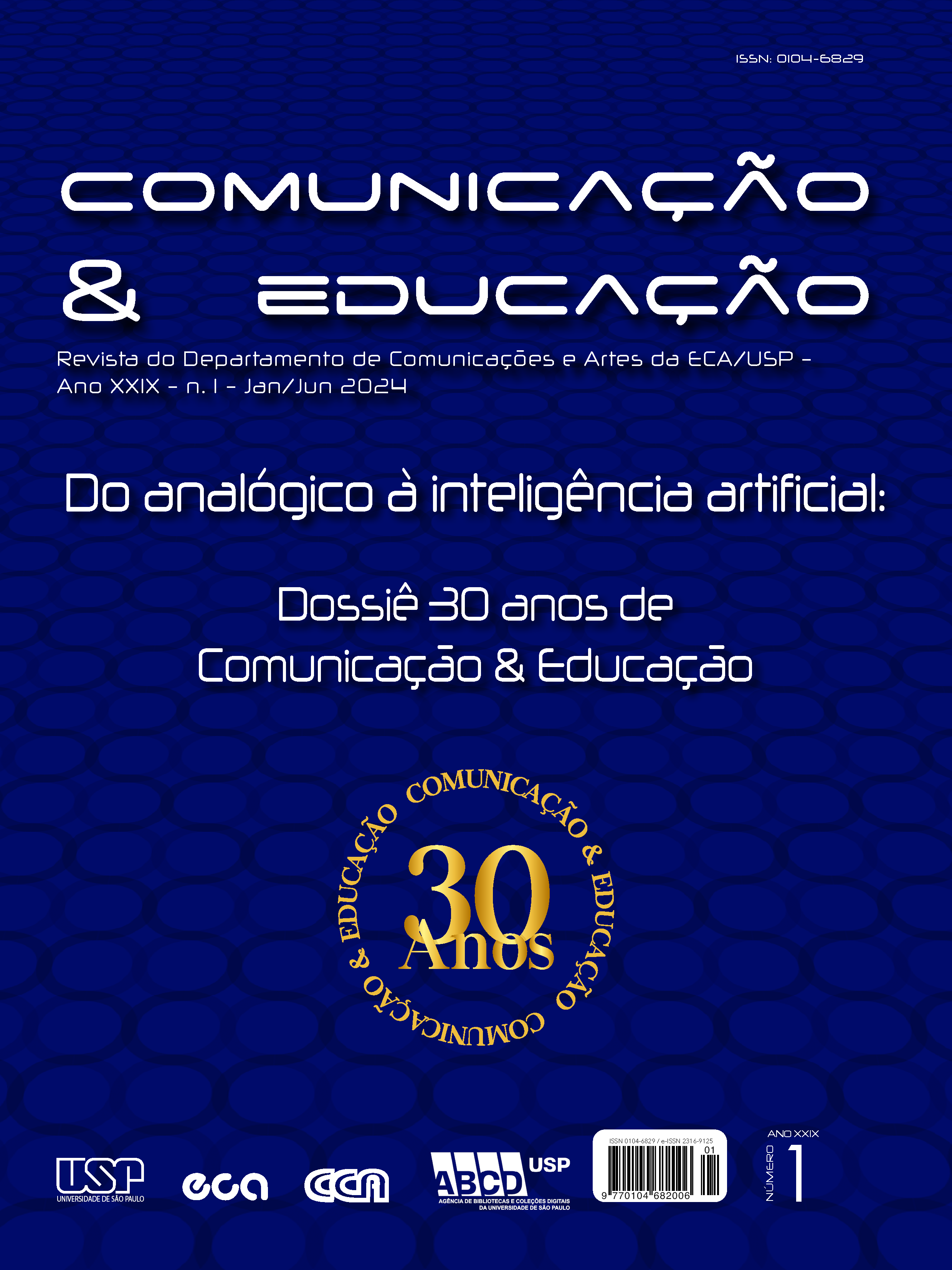Máquinas de ensinar analógicas: as precursoras da inteligência artificial na aprendizagem
DOI:
https://doi.org/10.11606/issn.2316-9125.v29i1p95-109Palavras-chave:
Inteligência artificial, Cognição, Tecnologias educacionais, Educação, Aprendizagem adaptativaResumo
O artigo apresenta um breve histórico das máquinas analógicas de ensinar criadas há quase um século, defendendo que elas podem ser consideradas as verdadeiras precursoras da inteligência artificial na educação. Para isso, examina as premissas dessas antigas máquinas, indicando que são muito parecidas com aquelas associadas, hoje, aos sistemas de aprendizagem de máquina. Essas premissas passam pela individualização do ensino, a redução de encargos com atividades maçantes para o professor e uma melhor experiência de ensino a partir da automatização do ensino. Também as apreensões hoje advindas da chegada dos sistemas de IA são parecidas com aquelas que povoaram a sociedade quando as máquinas analógicas apareceram – por exemplo, o receio da substituição do professor por artefatos robóticos e o medo de que ocorra um afastamento entre alunos e professores em vez de uma maior aproximação deles. Ao buscar essas conexões, o artigo lança olhares analíticos sobre as tecnologias digitais usadas para fins de aprendizagem, procurando contribuir para pavimentar o caminho para uma reflexão crítica sobre esses usos partindo da valorização da perspectiva humana sobre a inteligência artificial.
Downloads
Referências
BANNELL, Ralph Ings. Uma faca de dois gumes. In: FERREIRA, Giselle Giselle Martins dos Santos; ROSADO, Luiz A. S.; CARVALHO, Jaciara S. (org.) Educação e tecnologia: abordagens críticas. Rio de Janeiro: SESES – Sociedade de Ensino Superior Estácio de Sá, 2017, p. 17-82.
BIESTA, Gert. Against learning. Reclaiming a language for education in an age of learning. Nordisk Pedagogik, Oslo, v. 25, p. 54-66, 2005.
BANNELL, Ralph Ings; MIZRAHI, Mylene; FERREIRA, Giselle. (org.) (Des)educando a educação: Mentes, Materialidades e Metáforas. Rio de Janeiro: PUC-Rio, 2021.
BENJAMIN, Ludy T. A history of teaching machines. American Psychologist, Washingotn, D.C., v. 43, n. 9, p. 703-712, 1988. DOI: https://doi.org/10.1037/0003-066X.43.9.703.
CANDAU, Vera Maria. Ensino programado – Uma nova tecnologia didática. Rio de Janeiro: Inter Edições, 1969.
DOMINGOS, Pedro. The master algorithm. How the quest for the ultimate learning machine will remake our world. New York: Basic Books, 2015.
FERREIRA, Giselle Martins dos Santos; ROSADO, Luiz Alexandre da Silva; CARVALHO, Jaciara de Sá. (org.) Educação e tecnologia: abordagens críticas. Rio de Janeiro: SESES – Sociedade de Ensino Superior Estácio de Sá, 2017.
FERREIRA, Giselle Martins dos Santos. 2001, uma odisseia no espaço e o impacto da tecnologia. In: FERREIRA, Giselle Martins dos Santos; LEMGRUBER, Márcio Silveiro; CABRERA, Thiago Leite. (orgs.) Educação, tecnologia e ficção: da distopia à esperança. Rio de Janeiro: PUC-Rio, 2023.
HOLMES, Wayne; BIALIK, Maya; FADEL, Charles. Artificial intelligence in education – promises and implications for teaching and learning. Boston: The Center for Curriculum Redesign, 2019.
KNOX, Jeremy; WILLIAMSON, Ben; BAYNE, Sian. Machine behaviourism: future visions of “learnification” and “datafication” across humans and digital technologies. Learning, Media and Technology, Abingdon, v. 45, n. 1, p. 31-45, 2020.
NILSSON, Nils. The quest for artificial intelligence – A history of ideas and achievements. New York: Cambridge University Press, 2010.
PEA, Roy D. The prehistory of the learning sciences. In: EVANS, Michael A.; PACKER, Martin J.; SAWYER, R. Keith. Reflections on the learning sciences. Cambridge University Press, 2016.
PRESSEY, Sidney L. Development and appraisal of devices providing immediate automatic scoring of objective tests and concomitant self-instruction. The Journal of Psychology, [s. l.], 29:2, 417-447, 1950. DOI: 10.1080/00223980.1950.9916043
SELWYN, Neil. Should robots replace teachers? AI and the future of education. Medford: Polity Press, 2019.
WATTERS, Audrey. Gordon pask’s adaptive Teaching Machines. Hack Education, [s. l.], 28 mar. 2015. Disponível em: https://hackeducation.com/2015/03/28/pask. Acesso em: 10 set. 2021.
WATTERS, Audrey. Teaching machines. Cambridge: MIT Press, 2021.
WILLIAMSON, Ben; EYNON, Rebecca. Historical threads, missing links, and future directions in AI in education. Learning, Media and Technology, Abingdon, v. 45, n. 3, p. 223-235, 2020. DOI: 10.1080/17439884.2020.1798995
Publicado
Edição
Seção
Licença
Copyright (c) 2024 Camila Leporace

Este trabalho está licenciado sob uma licença Creative Commons Attribution 4.0 International License.
Autorizo a publicação do artigo submetido e cedo os direitos autorais à revista, na versão impressa e eletrônica, caso o mesmo seja aprovado após a avaliação dos pareceristas.
Estou ciente de que os leitores poderão usar este artigo sem prévia solicitação, desde que referidas a fonte e a autoria. Os leitores não estão autorizados a usar este artigo para reprodução, na integra ou em partes, para fins comerciais.

































